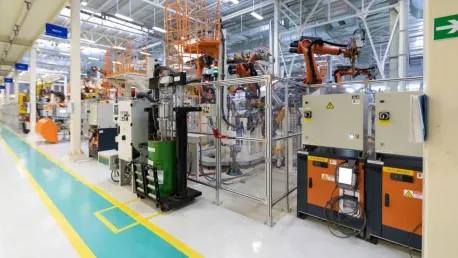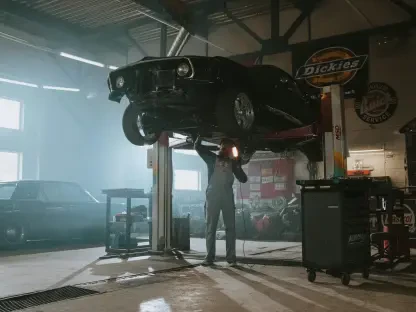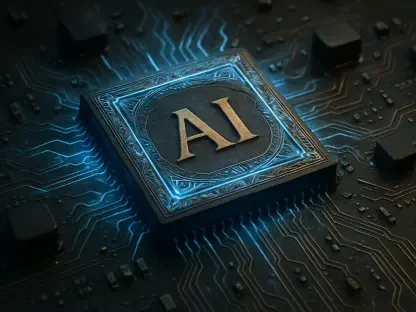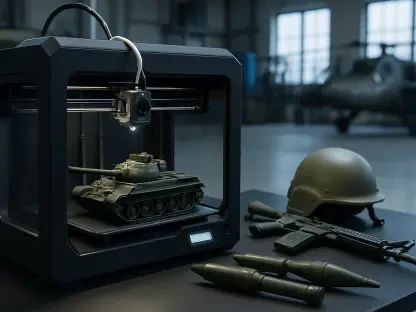In the rapidly evolving landscape of manufacturing, modern technologies are playing a pivotal role in revolutionizing processes and operations. The convergence of artificial intelligence (AI), machine learning, the Internet of Things (IoT), and other cutting-edge technologies is creating a dynamic shift toward greater efficiency, productivity, and sustainability. This transformation is not only making manufacturing more competitive but also driving significant advancements in sustainability practices and operational resilience. As organizations increasingly integrate these technologies into their manufacturing processes, a new era of smarter, faster, and greener production methods is emerging, promising to reshape industry standards for years to come.
Digital Transformation in Manufacturing
Digital transformation lies at the heart of modern manufacturing advancements, creating unprecedented opportunities for efficiency and innovation. The integration of Artificial Intelligence of Things (AIoT) represents a game-changing development, melding the capabilities of AI with the connectivity of IoT to create smarter factories. In such environments, data from connected devices flows seamlessly to enhance decision-making processes. For example, sensors on production lines gather vast amounts of data that can be analyzed in real-time to optimize operations, predict issues, and improve safety measures.
By leveraging AIoT, manufacturers can achieve significantly higher levels of productivity with minimal downtime. AI algorithms process data from IoT devices to provide actionable insights that enhance factory operations, ensuring that machines function at peak efficiency. This continuous feedback loop not only boosts productivity but also ensures that the working environment remains safe by predicting and mitigating potential hazards. The seamless integration of AI and IoT is setting a new standard for manufacturing efficiency and operational safety.
Predictive Maintenance
Predictive maintenance, powered by AI and machine learning, stands out as one of the most impactful innovations in modern manufacturing due to its potential to drastically reduce unexpected downtimes and associated repair costs. Traditional maintenance approaches are often reactive, addressing issues only after they occur, which can lead to significant disruptions in production schedules. In contrast, AI-driven predictive maintenance systems analyze vast amounts of data to forecast equipment failures before they happen, ensuring that machines operate smoothly and any potential downtime is minimized.
The accuracy of these predictive maintenance systems is remarkable, often exceeding 99% precision in predicting equipment failures. This high level of accuracy not only prevents unscheduled maintenance breaks but also significantly reduces operational costs. As a result, businesses can maintain a higher level of productivity and profitability while extending the lifespan of critical equipment. Predictive maintenance exemplifies how AI and machine learning can transform manufacturing processes, driving both operational excellence and financial efficiency.
Smart Buildings and Sustainability
Sustainability has become a top priority in the manufacturing sector, and smart building technologies are pivotal in achieving these ambitious environmental goals. By incorporating advanced systems for energy management, manufacturers can drastically reduce their carbon footprint and optimize the use of resources. Smart technologies enable real-time monitoring and optimization of energy consumption, ultimately moving the industry closer to achieving zero waste and more efficient use of resources.
A prime example of this is ABB Electrification’s Smart Buildings initiatives, which demonstrate how integrating smart technologies can streamline energy consumption and support sustainable manufacturing practices. These systems help manufacturers monitor and control energy usage, water consumption, and waste production, leading to more eco-friendly operations. In an era where environmental responsibility is increasingly crucial, the adoption of smart-building technologies represents a significant step towards sustainable manufacturing.
Scaling AI Across Enterprises
While the benefits of AI are well-recognized, scaling these technologies across large enterprises presents unique challenges that must be addressed to maintain a competitive edge. Achieving digital maturity is crucial for staying ahead in today’s fast-paced market, and AI plays a key role in managing complex supply chain dependencies, ensuring regulatory compliance, and enhancing overall operational efficiency. However, transitioning from pilot projects to full-scale AI implementation requires thorough planning, employee training, and continuous evaluation.
The strategic path to scaling AI encompasses a series of deliberate steps, involving the integration of AI applications across various operational areas. Enterprises that successfully implement AI initiatives can expect improved decision-making capabilities, streamlined operations, and increased agility in responding to market demands. By carefully managing the scaling process and addressing any challenges that arise, organizations can harness the full potential of AI to drive innovation and maintain a competitive advantage in the manufacturing landscape.
Financial Impact of Predictive Maintenance
The financial implications of adopting predictive maintenance technologies are substantial, underscoring the critical importance of maintaining operational efficiency. Industrial robots, for instance, can cost up to $2,500 per hour to operate, and any unplanned downtime or failure can lead to significant financial losses. Predictive maintenance plays a vital role in mitigating these risks by ensuring that machinery functions optimally and that maintenance is scheduled proactively rather than reactively.
By avoiding sudden equipment malfunctions, manufacturers can maintain steady production schedules and meet customer demands more reliably. Ensuring that industrial robots and other machinery operate without interruption translates to higher productivity and cost savings. The financial benefits of predictive maintenance are clear, allowing businesses to enhance their overall financial performance while maintaining a high level of operational efficiency.
Thermography in Preventative Maintenance
Thermography, or thermal imaging technology, is another innovative tool aiding in preventative maintenance by allowing manufacturers to proactively monitor the health of their equipment. By using infrared cameras to capture heat patterns of various types of machinery, manufacturers can identify anomalies that may indicate potential failures before any significant issues arise, ensuring continuous operation and mitigating the risk of unexpected downtime.
Thermal imaging provides a non-invasive method to monitor the health of machinery, enabling early detection of electrical problems, mechanical issues, and other hidden defects that could lead to equipment breakdowns. This proactive approach allows maintenance to be scheduled at the most opportune time, ensuring that machinery remains in optimal working condition. By integrating thermography into their maintenance strategies, manufacturers can enhance operational efficiency and reduce the risk of production disruptions.
AI and Machine Learning in Machining
The integration of AI with CNC machining is revolutionizing manufacturing operations by optimizing tool paths, improving precision, and reducing waste. AI algorithms enhance machining processes, leading to higher quality products and more efficient use of materials. This technological advancement plays a significant role in the competitive manufacturing landscape, as manufacturers strive to maintain high standards of product quality and operational efficiency.
AI-driven machining allows for adaptive and real-time adjustments during the manufacturing process, ensuring consistent product quality and increased operational efficiency. As AI technology continues to evolve, its impact on CNC machining and other manufacturing processes is expected to grow, paving the way for unprecedented levels of innovation and productivity. The integration of AI and machine learning in machining represents a transformative shift, offering manufacturers new opportunities to enhance their competitive edge in the industry.
Public-Private Collaborations
Collaboration between public institutions and private companies is critical for driving innovation in manufacturing technologies. Initiatives such as the NVIDIA AI Tech Community in Pittsburgh, developed in partnership with Carnegie Mellon University and the University of Pittsburgh, exemplify the potential of public-private collaborations to accelerate technological advancements. These joint efforts foster a fertile environment for the development and implementation of cutting-edge AI technologies, which in turn drive progress across the manufacturing sector.
Public-private partnerships provide a unique platform for combining the research capabilities of academic institutions with the practical expertise of private companies. By pooling resources and knowledge, these collaborations can tackle complex challenges and develop innovative solutions that benefit the entire manufacturing ecosystem. The success of public-private initiatives underscores the importance of cooperation in advancing manufacturing technologies and maintaining a competitive edge in the global market.
Conclusion
In today’s fast-paced manufacturing world, modern technologies are drastically transforming how processes and operations are carried out. The combination of artificial intelligence (AI), machine learning, the Internet of Things (IoT), and other state-of-the-art technologies is driving a significant shift toward enhanced efficiency, productivity, and sustainability. This technological evolution doesn’t just make manufacturing more competitive; it also fosters advancements in sustainability practices, ensuring processes that are environmentally friendly. As companies adopt these technologies in their manufacturing routines, they’re ushering in an era marked by smarter, quicker, and more eco-friendly production methods. This trend not only optimizes current operations but also sets new industry benchmarks for the future.
More manufacturers are recognizing the imperative of modernizing to stay ahead. AI and machine learning streamline decision-making, while IoT enables real-time monitoring and data collection, leading to proactive maintenance and reduced downtime. These innovations are vital for improving agility and resilience in the face of market fluctuations or supply chain disruptions. Moreover, the emphasis on sustainability is no longer just a regulatory requirement but a critical component of corporate responsibility and consumer demand. Altogether, this technological convergence is not just about keeping pace; it’s about setting the pace for an industry poised for monumental change.









